As children, our parents kept me and my sisters away from adultery and blaspheme by shifting to English. So we might all be sitting around and talking about the annual day celebrations of our village school in Koko, rural Nigeria, in Malayalam. Suddenly, they would go ‘Mrs Gloria caught Miss Pereira and Mr Okay in a tight embrace in an empty staffroom,’ in English. Or, how Umma, Fr John’s sister ‘was rumoured to have slept with half the congregation.’ We pretended these little loaded nuggets went over our heads so we could be privy to more. This practice by our folks continued even after all of us took our master’s degrees including two in English literature. By now these gems had lost their juice – they were relegated to comments on feuding relatives or dowdy ex-colleagues chanced on the street or supermarket. But feigning incomprehension had become habit for us; our own lives, definitely mine, had become the stuff they would have discussed over three decades ago – in English. And honestly we didn’t even bother to pay heed even.
But Mary chechi did.
We were perversely happy and aghast in equal measure when Mary chechi (a respectful term used for elder women in Kerala) our generally genial family help sprang ferocious each time English was spoken around her.
In the long line of illustrious helps arranged by agents, friends and relatives alike, Mary chechi lasted the longest. Struck by polio at a young age, her left leg was weaker and shorter – what she lacked in gait she made up everywhere else. She was unfazed in the face of most adversities, had pluck and was resilient – qualities mom wished rubbed on to her as one by one we children left home. After retiring from work at our home, she decided to repair to the ‘layam’ she shared with her sister and family. ‘Layam’ is living quarters for tea plantation workers with the barest amenities and the charm of a gulag. Though Mary had never been married, the sister had a husband and two grown children. Mary chechi earned a disability pension – an accrued sum that could be collected every few months. The day of collection, Mary chechi was queen – Queen Mary. The rest of the family would ferry her all decked up to the town treasury where she had to sign receipt of the cheque. On the way back – in a fully hired auto rickshaw – they would all eat biriyani, top up prepaid phone cards and the men would additionally be treated to bottles of whiskey. The other rare occasion she was queen was when my mom visited her annually around Christmas – with goodies for her and family.
Elappara, where the layam is, is about 50 km from Pala, my hometown. I hang around some days after my sisters and families leave post Christmas and we use this time to visit Mary chechi. As a clan we are genetically programmed to road trip so we consider this short drive a good getaway – the roads are suitably ragged, winding, climbing, the countryside camellian and you pass by villages fast losing their rusticity to shimmery glass-façades. Chatty villagers in colourful lungis and jockstrap hands lounging around newspapers and the skittish kids with wheeled toys. By the time we reach Wagamon, it is a pleasant 1200 metres above sea level. Here we take a slight detour up to the Kurisumala Ashram – which now has a gate. Each time we talk about the days we would bus all the way from Pala for weekend picnics as school kids. Mom’s favourite anecdote revolves around a cake upon which she embedded fondant for the first time – which resembled a landslide by the time we reached. She still holds a grudge towards the bus driver for being rash.
From Wagamon Elappara is 15 km through rolling tea estates. Munnar, Wayanad and Wagamon are the three largest tea-growing regions of Kerala. While Munnar and Wayanad are known tourism destinations, Wagamon hasn’t made the cut. The reasons are obvious – there are no decent hotels and the route is littered by domestic tourists who pack their food – like we used to. We lunched at a hotel that was part of a growing chain, the approach to which was clogged by hat and sweetmeat vendors.
“We have lodged a complaint against them,” the hotel manager informed me.
I wished him good luck in what will most definitely turn out to be the longest civil suit in history being a communist state.
The main junction at Elappara always looked like roads either went up or down. It still did. We had to go to a place called Chemmannu meaning ‘red sand’ just a couple of kilometres from town. The layam where Mary chechi lived was here. Though a torturous stretch, the short climb is quite picturesque and telling of changing times. You are surrounded by green carpeted mountains that undulate in every direction. A furniture shop strewed saw dust on the road and motorcycles parked near it. There were a few scattered people and children returning from school. Straggling groups of workers could be seen bending over tea buds with a clipper-like contraption. It was a new invention, supposed to make leaf picking easy and increase output per worker. But as Mary chechi told us later these clippers gave the workers severe back and shoulder strains. Since both the hands were literally tied up, one couldn’t easily break a fall in case of a slip or slide. So many were in the hospital undergoing treatment already while many were leaving jobs to find other non-existent ones. Some of the most beleaguered people you find in the most beautiful lands. Here they fought for livelihood, in other places it was for land.
A large stage flanking the road announced your arrival at Chemmannu – picture of which I had Instagrammed last year. I always believed it didn’t need any backdrop. Across the road were cemented white steps which led up to a temple. The narrow road sometimes treads very close to an un-barricaded steep. My mother who suffers from vertigo begins to belch from swelling tension. Much of the land that is not plantation is still forest, trickling brooks and fast drying water bodies. A few cattle strayed on to our path and one began to run ahead of us. The tea estate itself has shrouded pockets of vanilla plantations where male workers could be seen taking smoke breaks. From the road the way in to these estates look like a drop into thin air. ‘Must possess foothold like a mountain goat’ the job description would read if they advertised these openings.
Mary chechi was home watching an endless re-run of a popular comedy show on television – the trend currently ruling the TRP ratings roost in Kerala. Probably explaining her twice daily calls to mom – though mom herself says it is because Mary chechi loves her more than any of us kids. Mary chechi’s own initial awestruck expression and tears of joy soon gave way to garrulous warmth and her trademark jocundity. She kissed mom and took dad’s hands and was soon back to her blatherskite self. She grew goosebumps reminiscing about how dad pulled her into the Bangalore-bound train as it chugged out of the station. She cried over how mom used to help her up the stairs of the Maharani cinema in Pala. The memories are unchanging every year. She pulled me up for something I did years ago; I assured her I have done worse since.
“Time to go,” dad told mom about an hour later, in English.
“Five minutes daddy please,” Mary chechi replied, also in English.
Both my folks were stunned.
The last time I saw them in a similar daze was some years ago when they were discussing genus and specimens at home. As zoologists, they did that long into retirement. Rhesus monkeys figured in their talk and Mary chechi seethed.
“Why are you calling Jesus a monkey?” She asked shaking her index finger.








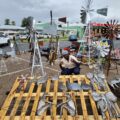
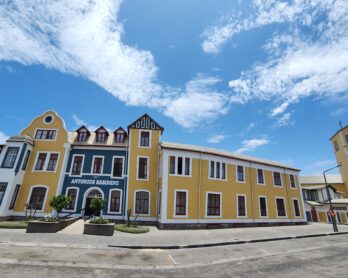
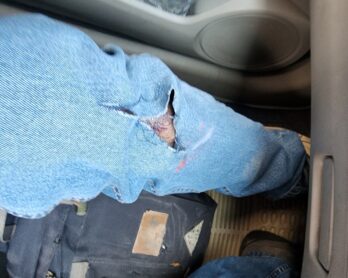
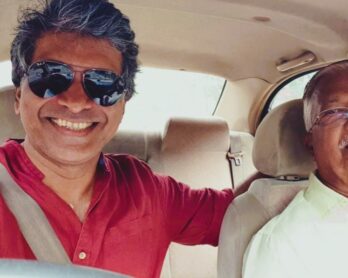
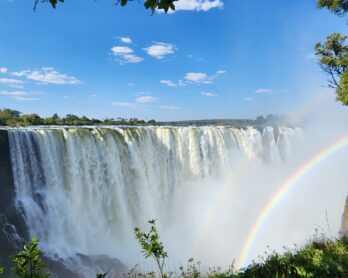
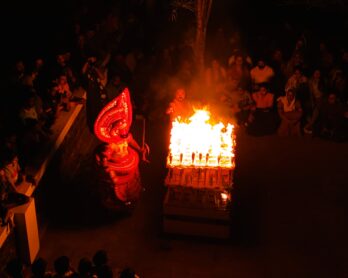
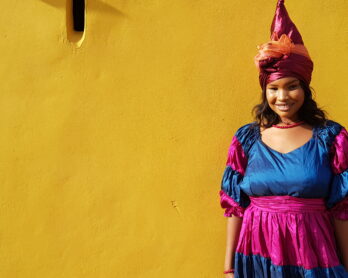
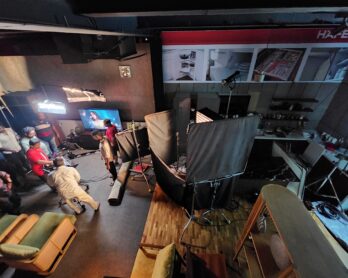

Thank you for this beautiful story about Mary chechi. I just recently came across your blog and have spent much time already browsing and reading and looking at your wonderful photography. I love your gentle approach towards letting the stories tell themselves, for lack of a better description…I will return often to check for new posts.
Much love from New Mexico!
Thank you for writing in, Steffi. I am glad you like my ‘gentle approach’ :)) Do swing by anytime, I try to update weekly, er fortnightly. Love from India.
thanks for this story
Hey!
Thanks for this blog. You are an inspiration for all newly borning travel bloggers and I am one of them. I want to start my career as a Travel blogger but due to lack of confidence, still, I am not doing what I want. Your blog gave me the strength to think out of my box.
Thanks for this blog and keep helping us by sharing your words.